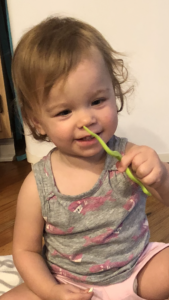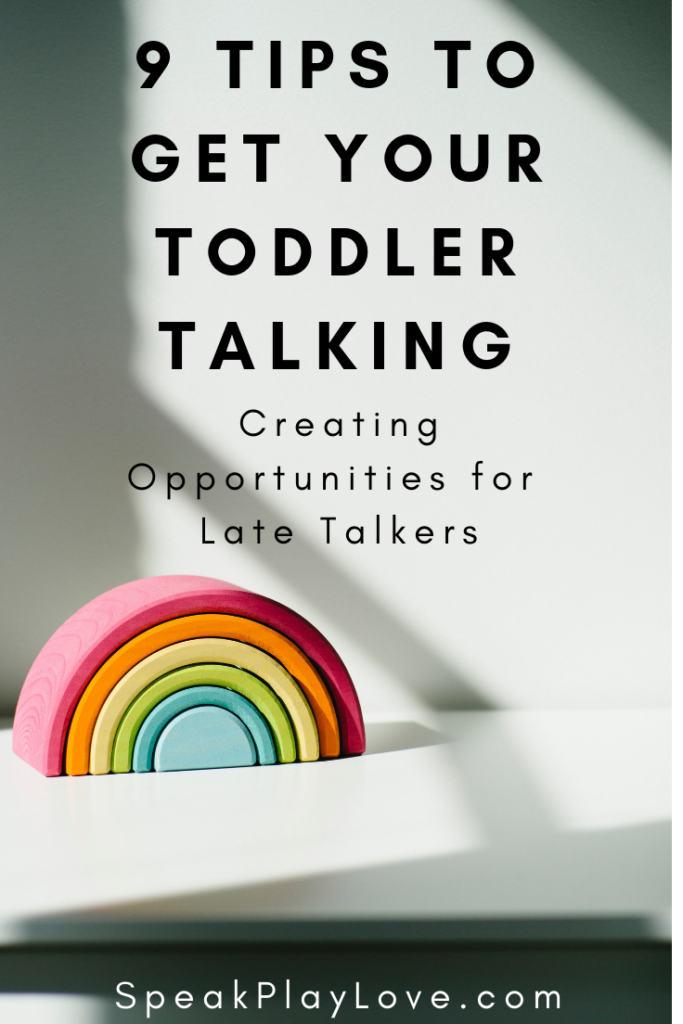
9 Tips to Get Your Toddler Talking: It’s All About Creating Opportunities
Do you have a child who has a few words mastered BUT he will only say them every once in a while? Do you hear a lot of whining? He might need more motivation along with extra opportunities throughout the day. Here are some tips and tricks to get your toddler talking:
RELATED: Grab these Song Choice Cards from my Etsy shop!
This post contains affiliate links, which means we could receive a commission if you click a link and purchase something that we have recommended.
1. The Expectant Pause:
This is great to practice when you are playing a repetitive game or song, but it can be used any time throughout the day when it’s time to say a word that your tot knows.
Example: After a few repetitions of saying, “Ready, Set, Go!” before putting your little one upside down or doing a pillow squish on her belly, you can say “Ready, Set . . .” Wait a few seconds with an excited, expectant look on your face to see if she will say “Go!” If she doesn’t say anything, then you can say it right before you do the action. When she does start to say it, then she won’t have to wait so long. So. . . talking = she gets the fun thing sooner!

2. Stopping Short During a Familiar Song:
This idea is just a different way of trying the Expectant Pause. Some songs that work well for this include
- “Ring Around the Rosies” – Stop before “down” to see if your little one will say it.
- “Old McDonald” – Go ahead and sing the fist couple of sounds and then see if your child will say that animal sound if you use the Expectant Pause.
RELATED: Grab these Song Choice Cards from my Etsy shop!
3. Don’t Anticipate His Every Need:
It feels good when you know exactly what your child wants, but think about it this way – Why would he need talk when you anticipate all his needs? Even if you know what he wants/needs, try to act confused to get him to communicate with you. If he continues to whine and point or lead you by the hand, you can say, “Oh, you want the _____, say _____”
4. Sabotage:

Okay, I know the word ‘sabotage’ sounds terrible (but that’s what we call it in the ‘biz’). It is really just setting up some opportunities around the house so you know your child will need to communicate to get your help.
Examples: Put a preferred toy within view but out of reach, so your child will have to ask you for help. OR put him in the bath but “forget” to put in the bath toys until he asks. Maybe start to eat one of his favorite snacks in front of him and don’t share until he uses some form of communication.
5. Give Repeated Opportunities at Meals/Snacks:
Instead of just giving her a bowl full of her favorite snack, only give her a little bit of the snack. Tell her, “When you want more, say ‘more.’” (Or any other word you think she’ll say). Yes, she might get a little frustrated but if she has the ability to say the word, this is a time you can wait her out a little bit. And if this is too hard, you can have her use sign language for “more”
6. Get Silly:
Sometimes reluctant talkers need practice making sounds with their mouth – fun sounds are a great place to start.
Example: If you have animal toys or books, see if your child will make animal sounds with you. OR try playing cars and making sounds like, “vrrooom,” “beep beep” and “crash.”

7. Give Out Pieces of a Toy One-by-One:
When you and your child are playing with a toy that has multiple pieces to it (puzzles, stacking cups/blocks, Mr. Potato Head, car ramp), try being “in control” of the pieces. Instead of just putting them out on the floor, you’ll want to have the pieces out of your child’s reach so he has an opportunity to request the piece instead of just grabbing the next one. If you want a detailed example of this technique, check out my article on Using Mr. Potato Head to Get Your Child to Talk (Read the Early Talker section).
RELATED: Grab these Song Choice Cards from my Etsy shop!
8. Encourage Any Attempt to Vocalize:
It doesn’t have to sound perfect or be the exact right word. If she says, “O” for “go” or says “car” instead of “truck.” Congratulate her! That’s a huge step in learning to talk. Sometimes I’ll say, “Good try! It’s like a car – it’s called a truck!”
9. Turn off the T.V or Tablet (or at least limit it):
Sure, there are educational programs out there and those are better than non-educational programs, BUT no program on television is going to increase language development the way that interacting with a parent/caregiver will. That’s because educational programs and apps teach concepts, but they don’t actually teach how to talk or give practice.
Research is now showing that over-use of devices can lead to delays in communication development, attention span, and school performance. Check out this article and video from the American Speech Language Hearing Association (ASHA).
Note: These tips are intended for children who are either still technically meeting their milestones, but are a bit on the late side (sometimes referred to as a Late Talker) or who are already receiving speech therapy and would like to supplement what the therapist is doing. (Remember that an SLP is only working with your child for a short time each week – YOU are the one with your child 99% of the time). If you have any concerns about your child’s development PLEASE talk to your child’s pediatrician and/or your local Early Intervention Program.
RELATED: Should You Call Early Intervention?
Want a printable version of this article? Click Here.
RELATED: Grab these Song Choice Cards from my Etsy shop!
Pin It for Later!





20 Comments
Susan
Can these tips be made into a printable format for caregivers
Margaret
Hi Susan,
A printable version of these tips is a great idea! I can make a simple, printable version for download that could be given to caregivers. What profession are you in? I can email it to the address you left when it is done. Though, it might be a couple of weeks – the blog to-do list is long these days 🙂
-Margaret
Amanda
I’m also looking for a printable version if possible. I’m a developmental special with Early intervention and would love to share this with caregivers
Margaret
I will email you a copy Amanda!
Bonnie Peterson
Could I also have a printable copy of this. I work in a preschool with a language therapist and have a grandson who is 21 months old and struggling with vocabulary…. thank you
Margaret
Thanks for reaching out – I just emailed you a copy of the “9 Tips to Get Your Toddler Talking”!
Sara
Excellent ideas!! I would like a printable copy as well. Just whenever you get time
Sarah McGovern
Good Morning, I work with parents of 0-5 year-olds and would love a printable copy. Besides potty training, speech development always seems to be the major milestone concern.
Cassie
Hi! Loved this article. I am a Developmental Specialist with Early Intervention and these are just the things I coach parents on when beginning to work with a child with a mild expressive language delay. Would it be possible to get a printable copy to leave with parents, to reinforce what we talk about in our visits? Thank you!!
Penelope Smith
My nephew has been having some issues with speaking lately. It is good to know that it would be smart to try asking him to repeat things at mealtime. It does seem like that could at least help communicate if he was hungry.
Kristofer Van Wagner
My sister shared that her son has been having some problems with speaking as of late. But my sister is also planning to send him to a daycare center. I will advise my sister to look for a center that knows how to deal with delayed speech problems so that he will be encouraged to communicate.
Megan Alder
My husband and I have been thinking about taking our 2-year-old son to pediatric therapy due to we’ve noticed that his talking has not evolved. I really like it when you said “Sabotage” is a good way to make your child having to communicate with you. I will definitely put your advice in practice while we find a well-qualified pediatric.
Anett
Can I have printable version please?
Margaret Feldmann, M.S., CCC-SLP
Hi Anett – There is a link to the printable version at the end (right before the last picture). Thanks! Margaret
Rachel Frampton
My four-year-old niece is having a hard time speaking, and that is why I told her mom that she must seek help from a pediatric therapist. Thank you for suggesting that it will be best to often play with him. I also agree with you that speech therapy will be effective.
Sheila VanDamme
Could I have a printable copy of 9 Tips …. thanks
Margaret Feldmann, M.S., CCC-SLP
Hi Beth – there is a link for the printable version near the end of the article – right before it says “Pin it for later” (sorry this is such a late response!)
beth
Can I get a printable version of this as well. I am a toddler teacher. Thanks!
Margaret Feldmann, M.S., CCC-SLP
Hi Beth – there is a link for the printable version near the end of the article – right before it says “Pin it for later”
Pingback: